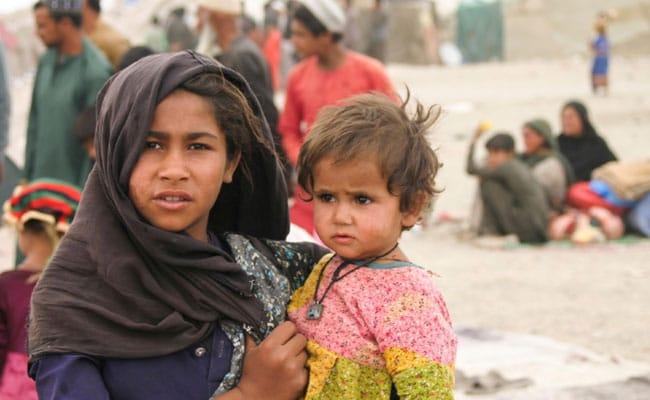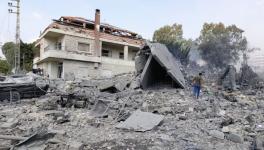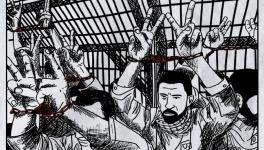Worst Ever Humanitarian Crisis Facing Afghan People

Image Courtesy: NDTV
The massive humanitarian crisis and the perilous condition of the economy in Afghanistan are likely to worsen with the impending onset of the harsh winter season for the second time since the Taliban took over power last August. The dire situation Afghanistan is currently experiencing is reflected by the fact that it has the highest prevalence of insufficient food consumption in the world, with as high as 92% of Afghan households struggling to meet their food needs, as per the United Nations (UN) data.
Acute malnutrition has been witnessed across the country. The World Health Organisation (WHO) has reported that tens of thousands of children are being admitted every month for emergency medical treatment for acute malnutrition. Many others in remote areas are unable to get help and have starved to death.
Over one million children under five – especially at risk of dying when deprived of food – are suffering from prolonged acute malnutrition, meaning that even if they survive, they face significant health problems, including stunting, the WHO has said.
Late last month, the UN's Resident and Humanitarian Coordinator for Afghanistan, Ramiz Alakbarov, termed the situation as “pure catastrophe” and noted that only 40% of the $4.4 billion required for the UN's 2022 Humanitarian Response Plan for Afghanistan had been received so far. The World Bank has also estimated that Afghanistan’s economic output has shrunk by 30% since August 2021 when the Taliban took over.
Serious Economic Crisis
After the fall of Kabul to the Taliban, the US seized $7 billion of foreign currency reserves from Da Afghanistan Bank and directed European allies to seize another $2 billion stored there. Without reserve currency to stabilise prices and balance exports and imports, the Afghan economy went haywire, with prices skyrocketing, the currency collapsing and imports coming to a complete halt.
The country is also experiencing runaway inflation along with a widespread shortage of bank notes. As described in the World Bank’s ‘Afghanistan Economic Monitor’ for August, prices for basic household goods saw 43.4% year-on-year inflation during July, while cash withdrawals from banks remained regulated for firms and individuals.
On top of it, UN and humanitarian officials have also alleged that the Taliban rulers were clearly interfering with the delivery of humanitarian aid, including in the selection of beneficiaries and channelling assistance to people on their own priority lists, and not the needy. It is, however, clear that the impoverishment of the Afghan people and the humanitarian crisis are a result of the serious economic crisis facing the landlocked nation.
Taliban and Human Rights
While the Taliban regime has been seeking global financial help along with its own funds seized by the US, humanitarian aid groups and international experts including Nobel laureates have urged Washington to release about $9billion to Afghanistan's central bank.
Taliban and American officials have reportedly held meetings to discuss mechanisms for releasing the funds in the past weeks. However, recent media reports indicate that these talks appear to have been complicated by the July 31 killing of al-Qaeda chief Ayman al-Zawahri, who was staying in a Kabul safe house reportedly controlled by a top Taliban leader.
In a recent statement, US Special Representative for Afghanistan, Thomas West, said: “We do not see recapitalisation of the Afghan central bank as a near-term option … the Taliban’s sheltering of al-Qaeda leader Ayman al-Zawahiri reinforces deep concerns we have regarding diversion of funds to terrorist groups.” There have also been terror attacks in various parts of Afghanistan, many of them claimed by the Islamic State (Khorasan) such as a bomb attack on a Kabul mosque that claimed at least 54 lives.
The human rights situation has also deteriorated sharply since the Taliban came to power. According to the United Nations Assistance Mission in Afghanistan (UNAMA), it has “documented persistent allegations of extrajudicial killings, arbitrary arrests and detentions, and torture and ill-treatment carried out by the de facto authorities.” The UNAMA report further says that women and girls, in particular, have been subjected to severe restrictions on their human rights, resulting in their exclusion from most aspects of everyday and public life.”
Taliban, UN and Women’s Rights
On September 12, a UN Human Rights Council meeting was held in Geneva where a senior UN expert raised an alarm saying the conditions in Afghanistan under Taliban rule indicate a "descent towards authoritarianism". He sought radical changes to stop the trend. "The severe rollback of the rights of women and girls, reprisals targeting opponents and critics, and a clampdown on freedom of expression by the Taliban amount to a descent towards authoritarianism," Richard Bennett, the UN special rapporteur on the human rights situation in Afghanistan, said at the meeting.
A year after the Taliban took over power, teenage girls are still barred from school and women are barred from working in offices and required to cover themselves from head to toe in public, despite initial promises to the contrary. Girls are prohibited from attending schools beyond primary classes.
The UN has also expressed serious concern about Taliban actions against Afghan female employees of the United Nations. “The UN urges the de facto authorities to abide by their obligations to respect the privileges and immunities of the UN and all its staff, including their freedom of movement throughout the country," a UN statement in Kabul said on September 12.
The statement said there has been "an emerging pattern of harassment of Afghan UN female staff by the de facto authorities, including an incident today in which three Afghan women working for the United Nations were singled out and temporarily detained for questioning by armed security agents of the de facto authorities." The UN demanded an immediate end to all such acts of intimidation and harassment targeting its Afghan female staff.
Earlier, UN Women, a United Nations entity dedicated to gender equality and the empowerment of women, had issued a Gender Alert last month saying one year on from the Taliban take-over in Afghanistan, women “are systematically excluded from public and political life, and restricted in their access to education, humanitarian assistance, employment, justice and health services.”
The international women’s body added that currently, there are no indicators that women’s fundamental rights and freedoms will be restored and the year-long trend suggests that these oppressive and discriminatory measures will persist. Among its recommendations are supporting Afghan women representatives to negotiate directly with the Taliban and demanding restoration of the full spectrum of women’s rights.
Taliban and Media Gag
Alongside, the media in the country has been facing continued attack and persecution at the hands of the new rulers- from physical assaults, threats and harassment- to censorship and harsh restrictions. While the region’s media unions have urged the Taliban rulers to respect press freedom and ensure the safety and security of all working journalists in Afghanistan, these appeals have gone unnoticed. In a press release, the International Federation of Journalists (IFJ) said the UN mission has documented a total of 173 media rights violations documented in Afghanistan from August 15, 2021, until June 15, 2022.
It has also reported the Taliban’s crackdown on public dissent by curbing protest activities and attacking the nation’s media, journalists and civil society leaders. A recent survey by an affiliate of the IFJ has estimated that approximately 86% of these violations were perpetrated by the Taliban.
Local media reports said a WhatsApp group dedicated to Afghan journalists who have escaped to Pakistan or elsewhere shows it has about 200 members who are either on the run or have fled from Afghanistan. These journalists have been sharing their stories on this Whatsapp group about living on the run with little help from the outside world and fearing retribution for their work.
One of the latest prominent personalities to flee from Afghanistan is Nasrin Shirzad, who made her mark on Afghanistan's media scene by covering issues that often conflicted with the Taliban's extremist views. Unemployed and fearing for her life, 42-year-old Shirzad, a journalist and anchor of Afghanistan's Ariana TV, fled with her family to neighbouring Pakistan after receiving several threatening letters.
Afghanistan, Taliban and World Community
The pathetic human rights condition and rising incidence of terrorism in Afghanistan have been a major concern for the world community and the UN. But there have been serious differences among major nations and members of the UN Security Council regarding the situation there.
On the one hand, Security Council members like the US, France and a few others are insisting that the Taliban must adhere to international standards if it wanted to gain global recognition and get economic and development aid from the international community. On the other, Russia has urged global donors to return Afghanistan’s “resources and to begin to provide comprehensive assistance to normalise the socio-economic and humanitarian situations without reservations or preconditions.” China too has said that “comprehensive measures should be taken to support sound development in Afghanistan.”
Both these nations have blamed the US and the North Atlantic Treaty Organisation (NATO) for the problems facing Afghanistan after the pullout of their forces. There is a real and urgent need for the provision of humanitarian assistance to the Afghan people, especially the children and women. Such assistance programmes can help mitigate the severe impact of Afghanistan’s economic crisis and bring genuine relief to many.
Hence, the members of the UN Security Council should set aside their differences and urgently focus on how to send such assistance to the impoverished people of Afghanistan, particularly ahead of the onset of the harsh winter. They should also ensure that humanitarian aid reaches only the needy and is not diverted by religious extremists.
The writer has extensively covered internal security, defence and civil aviation for the Press Trust of India for three decades. Views are personal.
Get the latest reports & analysis with people's perspective on Protests, movements & deep analytical videos, discussions of the current affairs in your Telegram app. Subscribe to NewsClick's Telegram channel & get Real-Time updates on stories, as they get published on our website.
























